#Star Trek politics
Explore tagged Tumblr posts
Text
The Cardassian War was worse than you probably think.
I wrote a lot about the Maquis with every intention of posting quite a bit more about it, but then I got cold feet. Its actually been a while since I watched some of the critical Maquis episodes. In some instances, I haven't seen them since they aired. So I decided to go back and rewatch some of them. I started with TNG 7x20 "Journey's End." Where I expected a very strident lecture on the evils of forced relocation, I found something deeply nuanced and something that also reframed how I understood the Federation's conflict with the Cardassians.
If you're in a hurry, the big revelation was that, per Picard, millions of people died in the Cardassian - Federation War.
If you haven't been part of debates about what the scale of the Star Trek setting is or are more attuned to more recent series, millions may not actually seem that many people. Star Wars and 40k fans are probably squinting and wondering what all the fuss is about.
So let me provide some additional context. This is going to be mostly Doylist in nature, i.e. "meta" commentary.
Millions of people equals thousands of Galaxy-class starships. At a time when we'd seen not more than two Galaxy-class starships on screen at the same time and per the Next Generation Technical Manual (which was quasi-canon at the time, essentially given high regard by creatives working on Trek but always subject to being overruled if the needs of the story dictated) there could be as few as five Galaxy-class starships active at the time, but perhaps eleven including the initial batch of six and assuming the six framed out but not completed hulls were built to completion and subtracting poor Yamato.
Just a few seasons before, the loss of 39 ships and 11,000 personnel at Wolf 359 was considered a pretty devastating loss.
If it were strictly Starfleet and Cardassian military personnel, millions would be staggering losses representing the equivalent of thousands of starships or some mix of ships and major stations or ground forces. My gut tells me that given the way TNG seems to be a smaller scale setting than Trek would later be depicted, this wasn't intended to be solely military losses but also inclusive of and maybe even disproportionately falling upon civilians. Given that the Federation doesn't directly target civilians as a general rule, I do have some theories on how this might come about: namely by making space warfare messier than its generally presented: Star Wars and The Expanse have both done great representation of how conflicts that play out in space can still result in collateral damage to civilian stations and planetary settlements.
Notably, later series like DS9 and Discovery will do a "soft" retcon of Starfleet to include as many as 7,000 ships in the 23rd century and perhaps around 30,000 in the 24th century (citation: Ron Moore & extrapolation based on fleet size quotes) but while this isn't a hard retcon in that it doesn't override firmly declared facts and figures, it also doesn't seem like these larger numbers were ones TNG was operating with when it threw a mere 40 ships at the Borg or had Starfleet yet again being unable to avoid pulling ships out of dock mid-refit and stuffing Enterprise crew on them to catch the Romulans smuggling arms to House Duras.
Regardless of how the numbers breakdown, this was anything but analogous to a protracted series of border skirmishes and raids ala the colonial theaters of various European imperial wars, which full disclosure, was my working mental model for understanding this conflict.
So why does this matter for understanding the Maquis?
I think it matters for understanding the Federation's motives in signing what most fans and many in universe characters feel is a "bad" peace with the Cardassians. This wasn't a vanity war that super powers sometimes find themselves in where they'll fight for years in some corner of the globe that is strategically irrelevant to the imperial heartland but has somehow gained incredible psychological significance in the minds of defense planners, politicians, and yellow journalists. This is a conflict that cost the Federation quite a bit of blood for planets that are described as having been settled for at most a few decades and, at the very least, we've never really heard anyone from the Federation complain about a lack of satisfactory M-class planets.
Of course as represented by the North American Indians (TNG's term, not mine) that had settled on Dorvan V, from the perspective of the colonists, they had roots and distinctive cultural identities that they desired to have respected and felt warranted their own planets. From the Federation's perspective, these are people who have barely settled their worlds and one world should be as good as another. If you run the numbers through "the needs of the many outweigh the needs of the few" then this starts looking even more tilted towards the Federation's perspective.
Now the counter argument is the bog standard opposition to authoritarianism and violent revisionists argument. This is the argument that the moral responsibility for avoiding catastrophic loss of life is on the one who is the first to use violence to try to advance their interests, at least at the level of astropolitics. In this framing it is not the responsibility of the Federation to mollify the Cardassians by conceding on irrational fears or immoral demands.
A cynical reading of this argument might find within it the notion that the Federation should just do what it wants, as long as its consistent with the Federation's values, and if the Cardassians have a problem with it up to the point of attacking, then the Federation should fight back and not stop until it reaches Cardassia and overthrows the military junta in charge or at the very least, removes any Cardassian presence from Federation borders and denudes Cardassian capacity to strike across the border.
The idea here being that conceding to the Cardassians rewards them for their willingness to use violence to achieve their goals, which further incentivizes them to use violence, and arguably did incentivize them to use violence as evidenced by accusations of poisoning wells and damaging infrastructure to drive ex-Federation citizens off the worlds that were ceded to the Cardassian Union.
But this argument has always contained within it the implicit assumption that the Federation had the capacity to rollback Cardassian warmaking capability and to keep up pressure on the Cardassians until the Cardassians cry uncle. A war in which millions died and where the Federation is trading away planets is not one that seems to imply the Federation had the capacity to hammer the Cardassians until they relented or there was a deficit of will to fight this war to the hilt, recognizing that pushing the war all the way to the orbit of Cardassia Prime would result in Union space being ungoverned and insecure until the infrastructure and ships were replaced.
Anyone who has watched the outcomes of the Global War on Terror or the various civil wars and revolutions that have happened in recent years should be very cognizant that a lack of order and security often results in problems being exported to adjacent regions. Problems meaning traumatized and impoverished refugees seeking safety and sustenance in places ill equipped to provide for them materially and often with some or a lot of mutual incoherence and mistrust happening at the cultural level as norms clash. Problems also meaning unaccounted for military equipment finding its way into the hands of revolutionaries, terrorists, and pirates who pursue their own goals and survival needs through the use of weapons on anyone who has something worth taking.
The United States did not kill a million or more people in Iraq, Afghanistan, and other MENA region countries through the use of weapons from 2001 to date. Iraq from 1991 to 2001 didn't have a million excess deaths* because of bombs detonating in people's homes, those deaths resulted from damage to infrastructure and internal supply chains because civilization is actually rather fragile and even people we regard as "less developed" are not meaningfully closer to nature and more resilient than we in the WEIRD category. If anything they exist in a more delicate state because they are often living on more marginal and stressed land with infrastructure that lacks redundancies or substantial state capacity to move people and resources around quickly to address sudden need.
*It should be noted that while these figures are widely quoted, the methodology has been questioned. I would encourage readers who want to get their historical facts correct to examine the evidence and decide whether Iraq sanctions are something one wants to use in a context other than describing the potential consequences of a fictional war.
When considering how to deal with Russia and its invasion of Ukraine, there are moral debates about how hard to press the civilian economy. Namely because so much of the infrastructure and daily necessities of life in modern countries count as "dual use." As in there are legitimate civilian uses that it doesn't seem productive to deny people: transistors are essential for access to information - both state controlled but also outside channels, and operate everything from thermostats to live saving medical equipment. The distinction between a transistor appropriate for running an insulin pump and one for a hypersonic missile is increasingly blurry.
An analogy could easily be drawn to isolinear chips and replicators. We in the fandom often assume that the Federation's ability to be precise in its application of lethal violence is practically omniscient and omnipotent, and that with its august technology, it has been liberated from having to make hard decisions. Yet if the Federation wants to destroy the warmaking capability of the Cardassians, how "deep" into the Cardassian infrastructure does it need to go?
Can you imagine Captain Picard sleeping well at night after calling a senior staff meeting to debate the legitimacy of striking a fusion reactor in a dense urban area that has been unplugged from the civilian grid and hooked up to an industrial replicator pumping out photon torpedo thrusters?
Further, the moral and political science assumptions of the Federation seem to rule out the idea that Cardassian civilians suffering and dying is an appropriate form of justice for Federation lives nor does suffering seem to predictably and reliably lead to revolution. Historical evidence is at best mixed and perhaps even damning. Try wrapping your head around the idea that Russian forces continued to fight their foreign enemies in WW1 at the same time as different Russian formations were fighting each other during the civil war that broke out as a direct consequence of World War 1. In short, while the war had certainly radicalized much of the public, there was still a lot of anger and blame directed to those who had been killing Russians before Russians were killing Russians.
So what is the Federation to do?
Keep fighting a war it probably wasn't technically losing but definitely didn't seem to be winning?
And perhaps the Federation couldn't win without paying a cost in both Federation and Cardassian lives, many of whom might be noncombatants, that was unpalatable?
What was it supposed to do after Wolf 359?
Postscript:
A bit more about the plot of the episode itself. "Journey's End" is probably one of the best TNG moral dilemma episodes. There are critiques to be made obviously. That the Indigenous people depicted seem to be a bit generic to the uneducated eye and do not claim a specific tribal / national identity feels weird at the end of 2024, but it also provokes an interesting discussion about the degree to which there isn't already a lot of syncretism among peoples who have experienced massive depopulation and loss of political agency, whether through intentional genocides, loss of territory, or disease. Its not hard to imagine this "North American Indian" identity found on Dorvan V being a syncretic identity that emerged in the 2100s once interstellar colonization really took off. Its strongly implied to be a "fresh start" movement that was itself controversial and many indigenous North Americas opted not to join them; but its membership could be plausibly drawn from many cultural identities.
However, the moral dilemma at the heart of the episode is handled with exquisite care and steadfastly refuses to make anyone objectively the bad guy. Every Federation character, even hardline consequentialist Admiral Nechayev, is respectful to the people of Dorvan V and mindful of their historical trauma even as it recognizes that the Federation's own interests are largely incompatible with respecting their demands.
Even Gul Evek, the named Cardassian leader of the show, relents after an impassioned plea from Picard. Evek admits to losing two out of three sons in the war and speculates that if the Dorvan V inhabitants leave the Cardassians alone, they will be left alone. Evek was convincing at least to this member of the audience. The framing felt hopeful rather than like everyone was being asked to swallow a Targ dung sandwich.
In checking to make sure I spelled his name correctly, I've become aware that Evek becomes a recurring character and I'm intrigued to see if there are clues to be found as to whether you could argue that he was lying or that events took on a life of their own and Evek was simply proven wrong. Its possible that Dorvan V was largely spared but the Obsidian Order or other elements of the Cardassian government decided to act in places it thought the Federation wouldn't be paying as close attention and the radicalization of the Maquis in turn radicalized Evek.
After all, since that the Cardassian Union was in effect waging a proxy war in the Demilitarized Zone, it would take little to convince some Cardassians that a guerilla movement with ex-Starfleet in almost all command roles and using Federation hardware represented a Federation proxy war with top level support. Which would in turn require the Federation to at least make some efforts at combating the Maquis in order to sell the Cardassians on the idea that the Maquis are not a plausibly deniable arm of Starfleet Intelligence.
But the Maquis are obviously are going to do what they need to do to defend their worlds, whether its their actual colonies or because they object to Starfleet sitting on its hands in the face of reports of atrocities.
In retrospect, for an era that was just testing the waters for multi-season arcs, this is such smart and tragic world building. Unlike say, the plot to destroy Qonos in Discovery or the anti-Changeling bioweapon being the Chekov's gun necessary to resolve the Dominion War, very little about the Maquis arc feels contrived and much more well supported by the world building around it.
#star trek#star trek ethics#astropolitics#maquis#star trek analysis#star trek politics#fandom commentary#michael eddington#Star Trek The Next Generation#st tng#star trek tng#tng#TNG 7x20#Journey's End#cardassian war#cardassians#the trolley problem
17 notes
·
View notes
Text

#spock#star trek#talk tag#introduce yourself as the guy that never lies = general vulcan political strategy since first contact
26K notes
·
View notes
Text
ALRIGHT LADS
WHO'S READY FOR
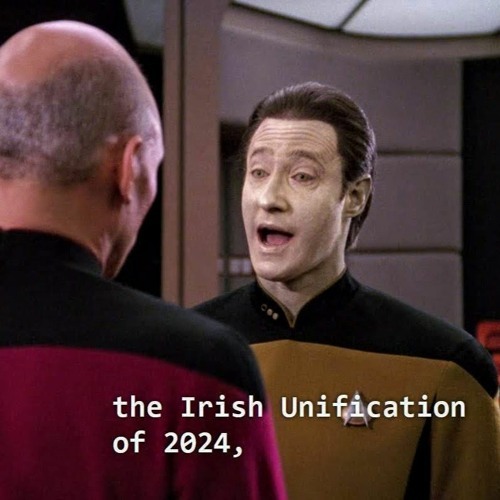
9K notes
·
View notes
Text
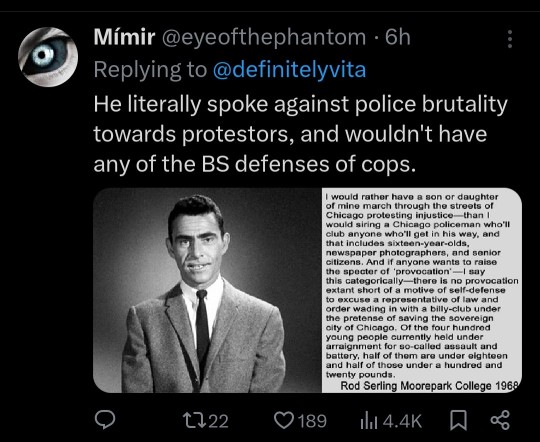
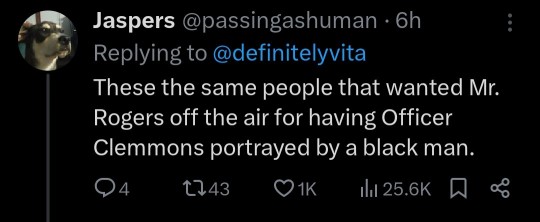
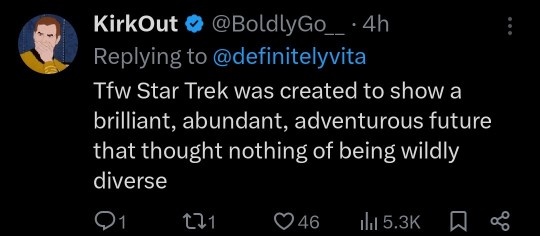
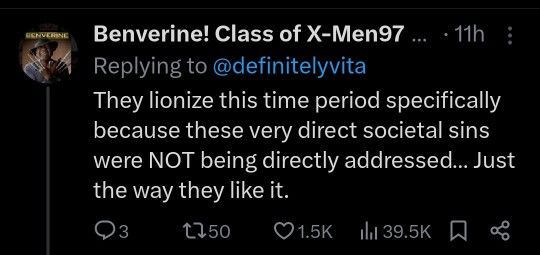
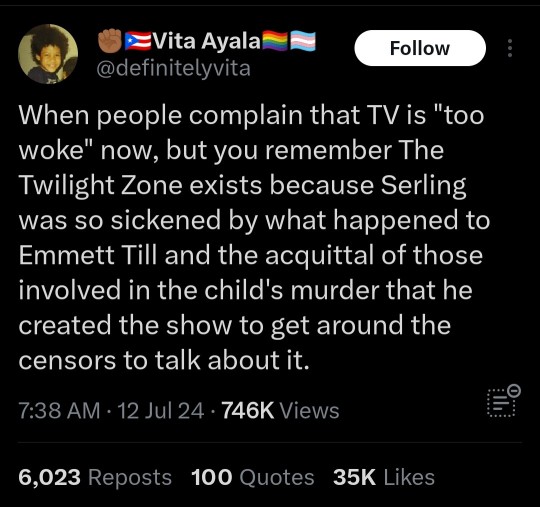
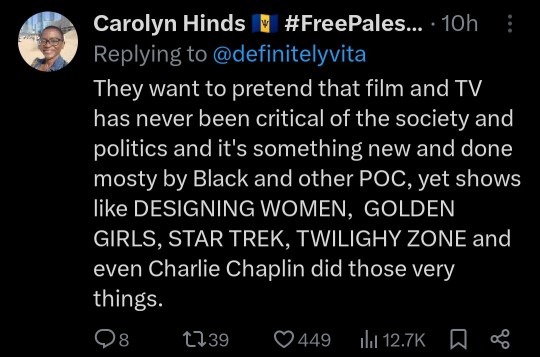
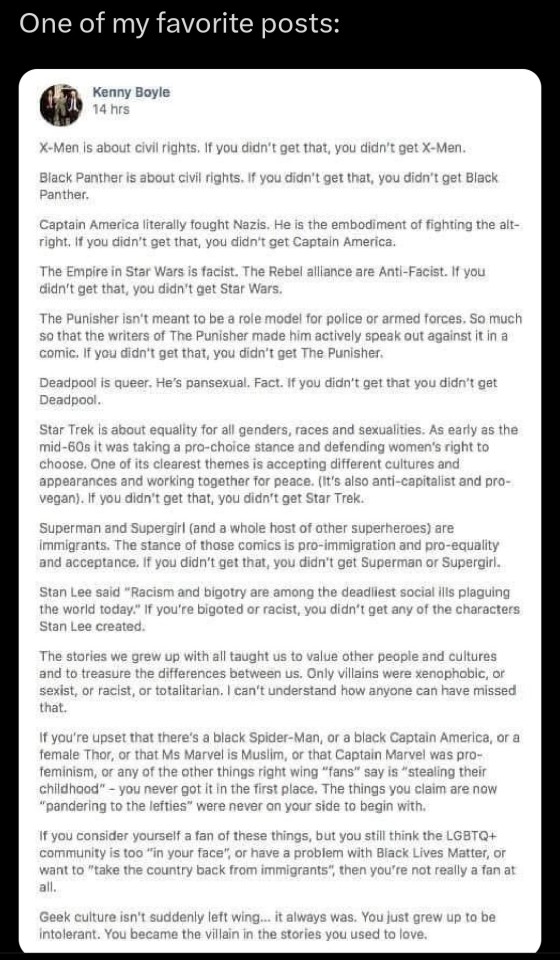
1K notes
·
View notes
Text
sisko: *sigh* against my will and for complicated political reasons I am sent to save your sorry cardassian ass yet again. just get in the fucking car already pls
gul dukat: there's a hidden meaning in that! the usurper of terok nor obviously desires me carnally
#star trek#star trek ds9#ds9#benjamin sisko#gul dukat#'really captain this is quite pathetic -- you don't need to go to all this trouble to get my attention ;) just offer me my office back'#sisko stares into the camera with real but understated suffering b/c that's what happens to a person dealing with dukat#poor sisko. he's trying to have one (ONE) nice uninterrupted date with kasidy and he gets sent to bail dukat out AGAIN#nightmare assignment#gul dukat is the political cockroach of the alpha quadrant and now we all have to live with it for seven seasons
2K notes
·
View notes
Text
favorite part of star trek the original series is seeing Spock make an ok joke that everyone laughs at the appropriate amount, except for Jim, who laughs way too long. like the only reason for him to laugh that long is to stroke Spock’s ego enough that he’ll get to stroke something else too.
#he’ll say highly illogical#everyone will politely laugh#and jim will just lose his shit#jim kirk#captain kirk#james t kirk#james tiberius kirk#s’chn t’gai spock#spock#tos star trek#star trek the original series#star trek#spirk#the premise#k/s
795 notes
·
View notes
Text

Twin Destiny Fanzine | Ann Crouch, 1983 More Spock in t-shirts by Ann Crouch here and here!
#spock#star trek#star trek tos#star trek the original series#leonard nimoy#sci fi#science fiction#fanzines#vintage#fan art#k/s#spirk#idic#the premise#fandom history#1980s#art#political art#immigrant#aliens#vulcan#pun#shitposting#alien
592 notes
·
View notes
Text
The choice to put Una Chin-Reily on a Starfleet recruitment poster in the late 2370s seems a nod to the extraordinary person she is and her exemplary service, but Boimler’s enthusiasm for her as a personal hero cannot mask the fact of what Starfleet execs are really doing here: while it is Starfleet tradition to honour esteemed personnel from its centuries of history, we have to look at the poster as a product of its time: it seems clear that, shortly after the devastating death toll and the rapid militarisation of the Dominion War, putting a prominent figure of the Great Exploration Age - and notedly someone who had not served in the Klingon War - as the poster person for Starfleet is an indictment that contemporary young people of the Federation are not drawn to the service as it is in their time anymore.
Critically, Starfleet has to use somebody from a 120 years ago, a timeframe that would lap generations of even especially long lived member species like Vulcans or Denobulans, to attract new recruits. Boimler says himself that seeing Una as a representative and her motto - “Ad astra per aspera” was: “Uh, it was a really big reason why I joined.” Clearly there is a wealth of recognisable Starfleet officers from 2370 and onwards, but their entanglement in the Dominion War, or at least in the Borg threat makes them unsuitable as role models for people like Boimler who cannot help but associate these contemporaries with the horrors of war and intergalactic conflict. Thus, the retreat to a “safe” historical narrative, with Starfleet still being about peaceful exploration reflects the growing divide between the realities of a colonised galaxy, the ongoing need of new bodies to fill the posts on all those ships and space stations and the aspirations and values of young people today. In this essay I will question whether Starfleet can keep its promise of scientific integrity in the face of growing political unrest in the UFP and ask what “Number One” herself would have thought about-
#i loved what the poster meant for una but really it IS kind of weird#like maybe if there is a series of posters#but especially picard establishes this growing resentment and whispers of plexits (planet exit) political problems in the UFP#which I KNOW are bc writers write what they see#but also...cant we not have nice things in the future. like a functioning united system of government#anyway imagine little boims or tendi seeing the news of the dominion fleet coming through the worm hole?#they should explore that. more.#star trek#snw#snw spoilers#una chin riley#number one#lower decks#brad boimler#bradward boimler#ufp#starfleet#mp#strange new worlds#star trek strange new worlds#star trek snw
2K notes
·
View notes
Text
Bill H.R. 9495, the Non-Profit Killer, is heading to the Senate
Bill H.R. 9495, aka the "Stop Terror-Financing and Tax Penalties on American Hostages Act" was meant to protect US Hostages from tax penalties; the bill received an add-on that would give the Treasury Secretary the power to strip any non-profit of their tax-exempt status based on the idea that the nonprofit is a "terrorist supporting" organization, all without due process or a justification.
This would give the upcoming Trump administration the power to kill any non-profit org, from AO3 to the ACLU. Even local nonprofits and independent news sources could be stripped of their status and be unable to receive funding to stay open, all because they had different views than the government.
Unfortunately, the bill passed the House and is headed towards the Senate. So I ask you all to find your Senator and then call, email, fax them a lot of times, and make as much noise as possible to tell them to vote no. I also ask you to do the same to these Democrat Senate leaders as well:
Chuck Schumer:
Phone: (202) 224-6542
Fax: (202) 228-3027
Dick Durbin:
Phone: 202-224-2152
Debbie Stabenow:
Phone:(202) 224-4822
Elizabeth Warren:
Phone: (202) 224-4543
Mark R. Warner:
Phone: 202-224-2023
Amy Klobuchar:
Phone: 202-224-3244
Fax: 202-228-2186
Bernie Sanders:
Phone: 202-224-5141 Fax: 202-228-0776
Catherine Cortez Masto:
Phone: (202) 224-3542
Joe Manchin:
Phone: 202-224-3954 Fax: 202-228-0002
Cory A. Booker:
Phone: (202) 224-3224
Fax: (202) 224-8378
Tammy Baldwin:
Phone: (202) 224-5653
Brian Schatz:
Phone: (202) 224-3934
Here are some tools:
Find your Senator:
Or you can call the Congressional switchboard today and ask to be connected with each of your Senators’ offices. Demand they vote against this bill: (202) 224-3121
Fax tool:
Here are some call scripts that you can use as fax and email as well:
If you have a Democrat Senator, you can use this script:
"I am calling Senator [THEIR LAST NAME] as a constituent to urge them to vote against the Stop Terror-Financing and Tax Penalties on American Hostages Act, when it comes to the Senate floor. This bill would give the Treasury the power to kill non-profit organizations without evidence, and will be used as a sledge hammer to destroy any organization that speaks out against the incoming President’s agenda. No matter who was in power, this bill would be authoritarian and ripe for abuse. Handing this power to a President known to be vindictive, and who has promised to be a “day one” dictator, would be a failure of congressional leadership. Please share my thoughts with the Senator, urging them to vote against this dangerous legislation. Thank you"
If you have a Republican Senator, you can use this script:
"I am calling Senator [THEIR LAST NAME] as a constituent to urge them to vote against the Stop Terror-Financing and Tax Penalties on American Hostages Act, when it comes to the Senate floor. This bill would give the Treasury the power to kill non-profit organizations without evidence, and will be used as a sledge hammer to destroy any organization that speaks out against the incoming President’s agenda. No matter who was in power, this bill would violate our First Amendment Rights. Handing this power to the Government would be a failure of congressional leadership. Please share my thoughts with the Senator, urging them to vote against this dangerous legislation. Thank you"
And I also urge you to sign these petitions/letters as well:
And again, please keep up the pressure, make your voices heard, continue to leave messages to your representatives and make sure they hear you either through voicemail, call, etc.
#us politics#hr 9495#united states#house of representatives#congress#us congress#fuck kosa#fuck project 2025#stop bad bills#fight for the future#stop internet censorship#aclu#american politics#lgbtq+#fuck donald trump#the owl house#steven universe#narilamb#cotl#moongirl and devil dinosaur#furry#anime#memes#helluva boss#hazbin hotel#nuzi#murder drones#star trek#star wars#minecraft
171 notes
·
View notes
Text
📰Khawla's Family Campaign Update: 80📰
$25,010/$80,000 as of November 4th [11pm CDT]
Currently $990 away from $26,000 as a short term goal!
If 2,750 people donated $20 the fundraiser would reach it's set goal!
Please consider donating even just $5, $10, or $20 to help the fundraiser further along. And remember that reblogging/sharing to reach more people can help a lot!
[for more information on the campaign: check my pinned post, the campaign page itself, or message me directly if you have any questions]
[tag list under the cut]:
@corpsenurse @vita-e @guiltycrunch @onetruesirius @gaysebastianvael @inplodinggofer616 @d3lph1unkn0wn @confusedsheepsblog @p33rpressure @ahperrytheplatypus @your-13th-suffers @hericanee @murderbot @arceusbeta @tam-shade-song @coleheinous @diberhaze @space-batzz @devilmeows @gizdathemxel
@slowbrobutch @hotsugarbyglassanimals @dubiousyuri @pinetreesdoodles @mores0 @suzu-by-starlight @sparky-is-spiders @hellotheretraveler @hahvdh @archferret @softeninglooks @moronic0xymoron @darthferbert @virgincognito @animebabe55 @profoundlyscreechingkryptonite @princessnessa2017-blog @neptuneschaos @the-mold-under-your-bed123 @ropes3amthoughts
@wild-forest-bee @rsquid2 @faerie-lights @lapastelr0sa @allegedlysicktomystomach @number-1-carrie-white-fan @adept7777 @cam24fan @strflwers @tremendousdreamtragedy @soullessjack @backgroundcharacterno15 @west-of-the-styx @apocalypsegay @something-writing @suburbananarch @fr0gie @stretchedbumhole201 @exltwounds @cori-randomstuff
@one-cold-witch @d1anna @esoteric-brustle @lpslover6669 @anakalos @buildmeupbuttercup14 @skkfujoshi @chaos-axolotl-reblogs @def-not-kaz-brekker @invulnerable-vaguewomen @dlxxv-vetted-donations @candycrypt1d @gryficowa @ocipiala @zaminami @mjthefaeva @nako-funky @kenniex2 @hananono @centi-pearl
@that-one-vangogh-painting @sappy-asphie @lotionlamp @kenniex2 @yeskhya @hyper-fucks-sake-tion @jauximeowmeow @lady-misaki @reymcmuffin @sufferswallow @thequeendied @a1m3v @parkerpresentz @extremereader @thetwistedarchives @absolutedoorknob @worowelf @hold-me-till-winter @beeware-of-lulu @littleladybaker
@plswtfdontdoitagain @footlongdingledong @cherrraty @heheheeheeh @fleurxduxmal @pintrestparasite @louisblue02 @clowdwatching @eldritch-something-or-other @sanguivorouscorvid @neoneone0 @p33p33p00p00 @mahougirlys @bi0feed @peppimeco @chiomn @himbo-noxx @louddragonphantom @futuristiccherryblossoms @market--land
@jellyfishinajamjar @rainbowpuppet @names-hard @deviouscowboy @moosebebignwatching @ginnyjuicee @dogbound1128 @greybear35-blog @dangerous-tangerine @wolfcubjim @l-dot-k-2 @yung-lean-hates-you-2 @ssak-i @koobird @mininightmare2 @strawberryglitterkiss @transexualcow @bluelunas @whenyou-wheni @bolas-de-berlim
@thesignpaintersstuff @sumthing69 @sentienceoverload-29 @theresamouseinmyhouse @kurtismcilroy @aswho1estuff @ratsnvermins @transvalkilmer @pipervonviper @cemetery-circus @tryceratops4 @woodwood6000 @katagawajr @aliensmoothie @nonbinarycryptology @the-number-1-iono-fan @mythicalbinicorn @talkswiththem @voidpumpkin @half-asleep-star
@luvdisc69 @ghostb3loved @fuckcapitalismasshole @no-clue-just-vibin @twashcat360 @amythestvaporeonbackup @lazy-but-amazing @dusty-brain @loucygoosey @bichi2004 @stalinistqueens @wynsummers @sad-cat-02 @rottingoranges @thingfromanoutherworld @ak1w1i @apinklion01 @cloxwork @polvuz
@therearenonutsforsomeendermen @noxumblog @ashkaranast @donationsmatter @punkeropercyjackson @callie-flower @patchoulitoes @stonedustghost @ofishally @stellaristcs @redmystery314 @asquidnotkid @omorimoroii @tanoroe @slightly-foolish @sergeantsarga @thebluespacecow @reusablebagofrats @eptck @577-6523
@killer-wizard @sapphicdragons-1 @rainy-clawz @afunlessland @dwarf-enjoyer @juchily @classyeyeballs @jeynees @ajatheoleander12 @sentienceoverload-29 @manic-pixie-dream-cock @jinnazah @1ikeavirgil @darlingbookworm @wetccarpet @chthonianalacrity @samurotting @aldryrththerainbowheart @mochipuppy16 @darinaethelaianprophet
@this-deadgirlwalking @rob-os-17 @moonbisexualsharktamerr @screamnpatches @luvdisc69 @ghostb3loved @fuckcapitalismasshole @no-clue-just-vibin @twashcat360 @amythestvaporeonbackup @lazy-but-amazing @dusty-brain @loucygoosey @bichi2004 @stalinistqueens @wynsummers @rottingoranges @thingfromanoutherworld @ashkaranast
@wetccarpet @chthonianalacrity @samurotting @aldryrththerainbowheart @mochipuppy16 @darinaethelaianprophet @rob-os-17 @moonbisexualsharktamerr @weakestwarrior @v1rtualv4mp @fiapple @tryna-sleep @snapcracklepop-myjoints @l-art-stuff-l @minosbull @duskstarshit @cosmicgamerboy @squidkiddoesstuff @attaboy-art @fireflyingaway
@blackcrystalball @lookineedsleep @lampthehealthminister @therealdjpocky @holyeaglecupcakesposts @amberspacedf @teeethbrush @bunnannie @lesbitching @lonelypotato23 @swaggy-hairy-thang @murenaaaaa @karlmarxmaybe @littlegaypancake @zimislockedinthefreezer @catboywillferal @yetisidelblog @tspicer23 @galax-dragon
@redpinejo @orphancat @sea-200 @literally-one-million-bees @aroacedisasterr @blvvdyindustries @sunmooneclipseandstars @theandroidsentbycyberl1fe @reblogingstuffrandomly @animatorfun @r4yt0r0f4nb0y @fazar234 @mstormcloud @theguiltygearheritageposts @doubleedgemode @millionthcephalophore @white-mirrors @cherubsaliaa @ash24601 @willhelmthewhale
@cipherinator @sister-lucifer @missivorystone @4de2ssy0 @alpabett @99orangeblossoms @totally-six @sematary-drive @knittedquails @masterofthepistachio @gagreflexoxo @owlchow @specificiumray @valentinemailbox @patzweigz @papus-clown-enclosure @montewave @chilewithcarnage @leftyreea @quesofromagecheese
@spookygayferret @cloudy-osc @thatonedemon @hellswolfie @hungee-boy @thenamelessdepths @courtly-kenzie @funnypickle3 @wompwompwoooooomp @ashytheslashy @magnuficentwo @thatgothicgirl @geodetojoy @feelo-fick @herondale-infj @nerdytextileartist @queencantaloupe @clownbugg-ie @xxhalfempty @ransiquack
@rowletlittenpopplioteam @the-coley-zone @furrysinthematrix @frograaa @mattsinclairvo @snufkin1970 @bi-worm @sillymarillly @luckycloverforducks @sithlordpadawan @kippahkaplan @bonecodoposto-45 @tinkerscrickets @starshinesparkle @commersons-fucking-dolphin @soulessdeadpool13 @kasthejackass @icaruslore @maln0x @fancyli
#status update#us politics#star trek#s9#dimension 20#supernatural#steven universe#deltarune#sonic x shadow generations#videogames#< tags for reach#vetted by association#gfm#donate#palestine#free palestine#rafah#all eyes on rafah#gaza fundraiser#gaza relief#humanitarian aid#mutual aid#gaza#gaza strip#donations#gazaunderattack#gofundme#fundrasier#gaza genocide
192 notes
·
View notes
Text
Star Trek and the Maquis: A Contest of Metaphors
This was inspired by an Ask many moons ago. I had the majority of this written within a week but then two hurricanes and a lot of wrangling over how to edit it coherently later, I'm just going to publish it as a series of rather messy and meandering essays.
The Maquis are a bit of an inkblot test for fans. While the narrative certainly goes to great efforts to skew us towards being sympathetic to them and aghast at the Federation's complicity in trying to squelch their uprising, I maintain there is room for valid disagreement on just how "in the wrong" the Federation was.
The inkblot test aspect of it comes down to how different members of the audience think about state level warfare and irregular warfare, aka insurgency, and maybe even terrorism.
For instance the Maquis, or at least Michael Eddington's faction, will wind up crossing the line that most people seem to think is the line between insurgency and terrorism: namely the indiscriminate targeting of civilians and noncombatants. Although a disturbing feature of debates about fictional and non-fictional peoples and movements can include some litigation of who is really a non-combatant and whether the moral protection that status confers can be stripped away by mitigating circumstances like being the beneficiary of state violence or being an accessory to atrocious acts without actually directly carrying them out.
At the same time, we also know that the Federation's attempt at a lasting peace with the Cardassians was doomed from the start: brazenly insincere on the part of the Cardassians, purchased by the Federation with a high price in moral credibility, and ends in the Cardassians welcoming the Dominion into the Alpha Quadrant. This line of thinking often ends in a presumption that since efforts to secure peace ultimately failed, those efforts were wholly a waste, preemptive violence should have been undertaken, and anyone who acted as if the failure of peace wasn't preordained was a blind fool.
Knowing where the story ends doesn't mean we can't still debate the Federation's degree of culpability for not intervening sooner to ensure that things don't reach a point where indiscriminate targeting of noncombatants by ex-Federation civilians is imminent.
A big part of what makes this an inkblot test is because it almost assuredly is a reflection on which analogies loom largest in the mind of the viewer. As it turns out, your preferred reference point for understanding war may strongly influence who you are sympathetic to and how you interpret the risks and ethics involved in any course of action chosen by the Federation and Maquis.
Understanding the Maquis
What I am going to do is, look at three main ideas that I think are most critical for seeing different sides of arguments around the Maquis, the Federation, the Cardassians and how each is understood by fans in terms of sympathy or malice, and in some instances, how they might be understood differently depending on how said fans process stories of state and irregular violence.
The social context of how different fans (and Trek writers) think of state level warfare and irregular warfare.
What was actually happening in the Trek universe around this time and to what degree the Maquis narrative encourages treating its storyline as existing outside of any other broader context.
The competing interests of the state to protect the many vs the rights of the few to defend their homes and way of life.
These are going to get elaborated on in subsequent posts, but very quickly here's a summary of the main points:
Social Context
Since the Russian invasion of Ukraine in 2022, this has become a dominant metaphor for understanding the Federation - Cardassian relationship. Suffice to say, those for whom this metaphor has the most power understand this as an unambiguous contest of moral systems wherein the Federation is guilty of abdicating responsibility for victims of an expansionist autocracy with numerous atrocities on its record and no extenuating circumstances that reduce the magnitude of the Federation's guilt.
Prior to 2022, it is my observation that several other metaphors might have applied: the Kurdish resistance to ISIL (another metaphor that strongly favors the Maquis and condemns the Federation), the Afghan Mujahideen (a cautionary tale in which the nurturing of a sympathetic resistance movement facing oppression has unintended consequences, i.e. 9/11), and finally Cold War dovishness. Cold War dovishness I would describe as not so pacifistic as to be unwilling to engage in any amount of armed conflict but a deep wariness of it. This is an idea that conflicts between a great power and a lesser may be much more challenging than expected, pose escalation risks that could become existential, and even if carefully managed the conflict may have second and tertiary consequences that neutralize, even harm the agenda of the greater power: i.e. "blowback."
I bring this guy up a lot, but I do think there was an episode or two where Tomalak might have been the Romulan Vasily Arkhipov. The Soviet officer who arguably saved the world by defying standing orders to use nuclear weapons during the Cuban Missile Crisis when certain conditions were met. I bring up Arkhipov a lot, along with Stanislav Petrov (a second Russian who may have saved the world) because I think he's incredibly important to understanding how Pre-Dominion War Trek understood state level conflict and why a power like the Federation that constantly signals about how important it thinks universal sentient rights are might sign away some inhabited planets to move down a few steps on the escalation ladder.
Astropolitical Context
The careful viewer recognizes that the Cardassians are far from the only problem the Federation has and thus, while we are not explicitly reminded of these issues, they are important context for the Federation choosing a bad peace over waging what many fans perceive to be a virtuous and largely consequence free war. After signing the peace treaty with the Cardassians, these problems are also likely explanations for why the Federation seems to dither and pursue largely diplomatic solutions to the Maquis crisis with the Cardassians rather than throwing its weight around or even directly siding with the Maquis.
The Borg are a known unknown: they are an existential threat if they choose to be, the Federation lost more ships in one battle than had ever been previously mentioned as being in one place at one time in Trek history. We can massage this to fit with later canon by assuming the Borg were, to borrow an Ian Banks term, an "Outside Context Problem." It had been a while since some inscrutable, unstoppable weird alien thing had bypassed every patrol and defensive position to menace Sol directly (although there was that time where it happened twice in the span of a decade) and the Federation had grown so dramatically that it really couldn't afford to have more than forty ships within 48 hours notice to cover Sol, including ships just fitting out, under refit, or in ready reserve.
The Klingons fought a civil war that ultimately exposed ties between the Romulans and the now disgraced, but previously deeply influential Duras Family. Schisms like that don't necessarily heal cleanly or swiftly. The allies of the Duras were shamed and likely had to pay lip service to unity, but they almost certainly had ideological and pragmatic reasons for aligning with the Duras, a disdain for the Khitomer Accords being among them.
The Romulans are another known unknown. They certainly want the Federation to think that they're willing to risk an existential conflict over particular disputes but play their actual motives close to the vest. The fact that these conflicts don't actually spiral into war at least seems to strongly suggest that the Romulans are paranoid, not suicidal, and that their imperialism is tempered by pragmatism. We're never privy to any info dumps on Starfleet's intelligence assessments about their relative power compared to the Federation, but logically even a weak Romulan Star Empire is capable of a lot of mischief up to and including inflicting massive civilian casualties if it desires.
I'm open to correction on this if someone with a more recent engagement with the Maquis arc thinks I'm wrong, but it's my contention that very little of what I just wrote found its way into the foreground as part of the Federation's rationale for accepting a peace with the Cardassians. By foreground I mean cited as reasons for the peace or for siding against the Maquis by Federation characters.
I don't think making peace with an authoritarian regime is the sole reason why the Federation gets held up as an example of why the Federation is a more cynical and "US-coded" actor than it likes to pretend, but even I was surprised at just how exculpatory the broader context is. I expected to wage a rhetorical fight to defend peace on its own merits and wound up being shocked at how during the same period the Federation is trying to maintain the peace with the Cardassians, how many near misses the Federation has with open war with powers that had the potential to decisively win against the Federation, and in the case of the Borg, not just subjugate but utterly annihilate the Federation.
Which many, whose needs?
The argument you very rarely see these days, especially in a post 9/11, post Russian invasion of Ukraine world is that the Federation should have just removed the settlers and called it a day. The irony here is that from a strictly utilitarian, harm reduction standpoint this might actually be the right move.
However, two extremely valid critiques are that this is rooted in presentism: we can argue that there are reasons to suspect the peace with the Cardassians isn't worth the isolinear chips its encoded on but the principle actors can't know for sure in the moment it's all going to be pointless.
It also flies in the face of Trek's ethos that, while consequentialism is highly important, it's tempered by the notion that virtue ethics has its role to play as well. That is to say that some actions are just or unjust, good or bad simply because they are. Thus I cannot think of a lot that would be less Star Trek than a forced relocation of people from their homes. Of course one might also say that it's not especially noble to risk interstellar war and billions of lives over attachment to said homes.
Whether the same Star Trek ethos demands that these people be protected is a nastier business that circles back to what metaphor we use to think about state and irregular warfare in Star Trek but also whether we as fans lean more towards the virtue ethics side of the equation or the consequentialist side.
What makes the Maquis interesting is that, like so much of DS9, the writers refused to provide the sort of easy, positive sum solution that Trek, or at least TNG, was/is known for. There is no scenario in which risks are not undertaken. No scenario in which an empathetic being is going to walk away with a clean conscience. One way or another, either the safety of the settlers is being used as a commodity, their rights revoked entirely, or the other trillion odd beings in the Federation are asked to be in solidarity with the few and risk everything.
Up next: Storytelling insurgency in Star Trek
#star trek#ds9#maquis#guerilla warfare#irregular warfare#imperialism#michael eddington#ben sisko#Cardassians#Star Trek ethics#Star Trek politics#astropolitics#Stanislav Petrov#Star Trek analysis#Vasily Arkhipov#star trek fandom
13 notes
·
View notes
Text
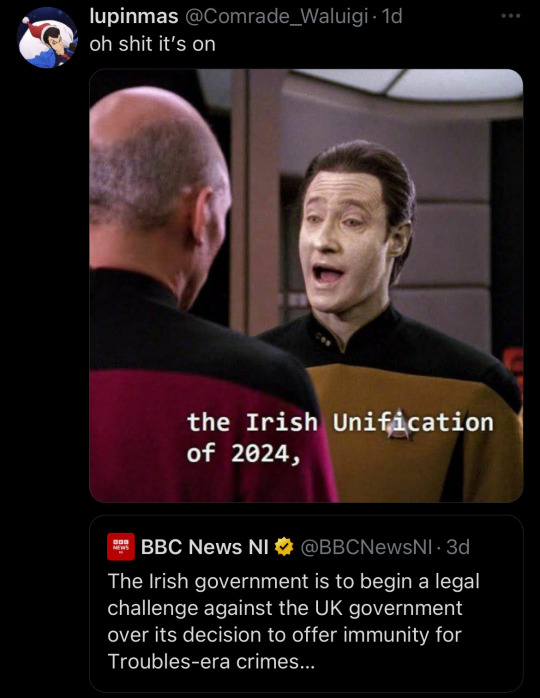
#finally it’s time#star trek#star trek tng#star trek ds9#tng#the next generation#tng data#data soong#politics
930 notes
·
View notes
Text
Happy Putin officially declares war with NATO canon Spirk minisode Trump making a Fox News host a member of the Federal cabinet day I guess
#WHAT IS GOING ON BRUH#spirk#putin#election 2024#election#star trek#nuclear war#us politics#world politics
180 notes
·
View notes
Text
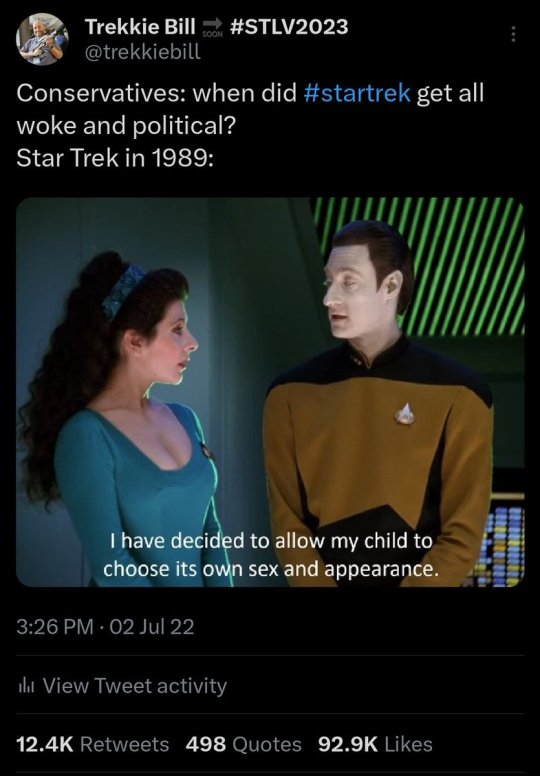
2K notes
·
View notes
Text
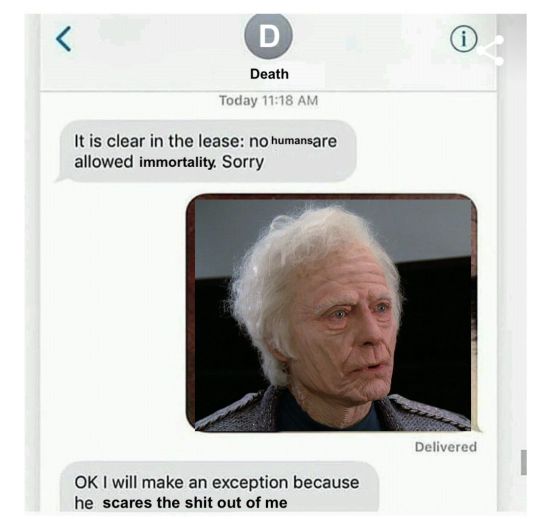
My theory on how it went down
#star trek#star trek tos#leonard mccoy#bones mccoy#star trek tng#encounter at farpoint#he looks very polite#he looks very polite meme#bones is extremely impolite to death#thus he is immortal
541 notes
·
View notes
Text
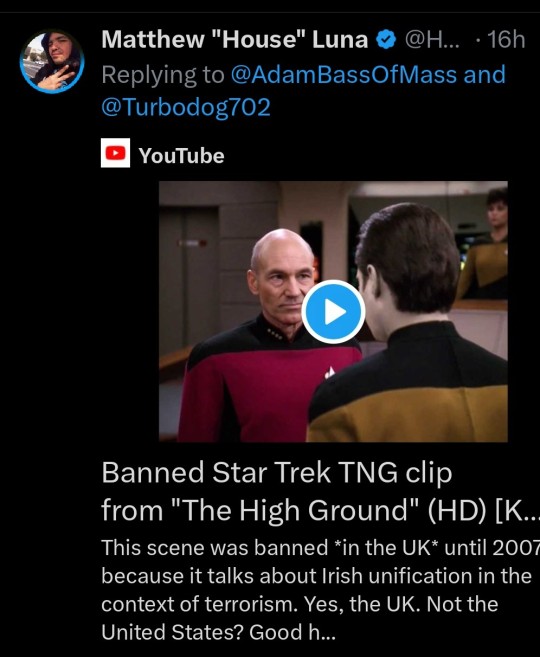
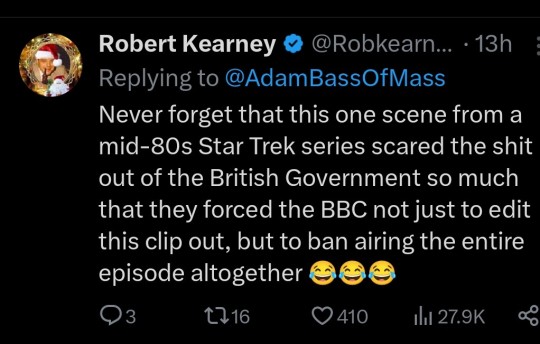
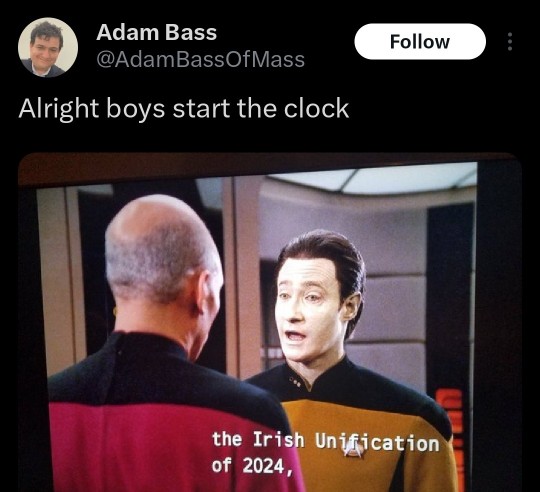
757 notes
·
View notes